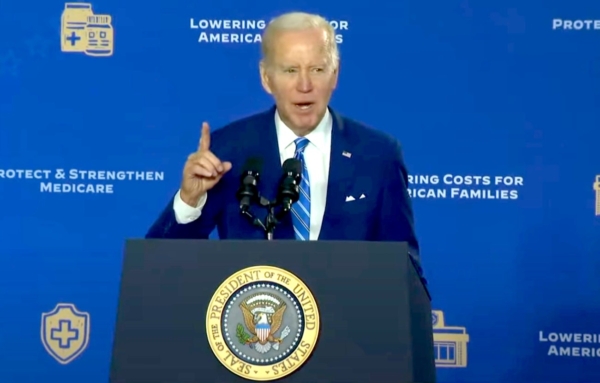
All but the most upper-income seniors would be hurt by cuts to Social Security and Medicare — the kind which Republicans have been proposing in the name of “entitlement reform.” But older Americans with disabilities or pre-existing conditions would be hit especially hard. Whether these cuts apply to future generations or today’s seniors, they are unsustainable for the people these programs are designed to protect.
We reached out to our social media community to ask about the potential impact of Social Security and Medicare cuts. The testimonials we received were quite poignant – and to the point. “I live with depression, Graves disease, and COPD,” wrote a Facebook follower named Susan. “Without Medicare, I would be paying well over $500 dollars a month for medicine. If I don’t have medication to breathe, I will be a dead woman.”
Another Facebook user, Martin, is on Social Security Disability Insurance after suffering a head injury. “Social Security checks pay for my rent and utilities and internet. Without it, I couldn’t pay my bills,” he writes. Martin has seizures controlled by medication. “Medicare keeps my medical bills low,” he says.
Facebook user Natalie had a heart attack and suffers from COPD. She is severely disabled and bedridden. She wonders, if Social Security and Medicare are cut, “Who will pay for my rent and the utilities and my medications or groceries?”
For each of these stories, there no doubt are millions more across the country: Americans who worked hard and paid into Social Security and Medicare their entire lives, and now depend on those benefits for financial and physical survival.
Republicans insist that they have taken Social Security and Medicare cuts off the table in the debt ceiling debate. Even Senator Rick Scott (R-FL) backtracked on his 2022 proposal to ‘sunset’ all federal programs after five years, including Social Security and Medicare. He has introduced legislation to make it harder to cut either program.

“If cutting Social Security and Medicare is your dream, I’m your nightmare,” says President Biden.
This softening on the part of some Republicans is the result of political backlash to various GOP plans (of which Senator Scott’s original proposal was one of the most egregious) which would result in cuts to Americans’ earned benefits. These include: Senator Ron Johnson’s plan to switch Social Security and Medicare to “discretionary” rather than “mandatory” spending.; the House Republican Study Committee blueprint that would raise the retirement age, means-test benefits, and adopt a more miserly COLA formula; and the Cassidy-King plan to invest part of the Social Security trust fund on Wall Street, a scheme that would require benefit cuts in order for its math to add up.
After President Biden seemingly coaxed Republicans to agree on live tv not to cut Social Security or Medicare during the State of the Union, we wrote in a blog post that advocates do not consider seniors’ benefits to be completely safe. “It’s not like the verbal agreement at the State of the Union was signed in blood or anything,” observed Dan Adcock, our director of government relations and policy. “We’re not going to let our guard down.”
President Biden continues vigilant on this issue, as well, vowing to veto any legislation that would reduce senior’s benefits.
“I know that a lot of Republicans, their dream is to cut Social Security and Medicare. Well, let me say this: if that’s your dream, I’m your nightmare.” – President Biden, Tampa, FL,
Circling back now to older Americans with disabilities and pre-existing conditions, why would cuts to these programs impact them so dramatically? For one thing, many people with disabilities are unable to work. Disability makes older Americans more financially vulnerable, and often results in diminished income.
“Because of their disabilities and chronic health conditions, these people couldn’t save as much for retirement,” explains our senior policy advisor, Anne Montgomery, an expert in health advocacy and disability issues. “Their incomes may be more limited than healthier individuals.” A retiree named Lorraine told us via Facebook that she would be “out on the street” without her earned benefits.
Martin, whose testimonial we included above, is one of about 8 million people who receive Social Security Disability Insurance (SSDI) to remain financially secure. These beneficiaries cannot afford benefit cuts. (It should be noted that President Trump proposed cutting SSDI by billions of dollars in successive budgets his administration sent to Congress, even though Trump famously promised “not to touch” Social Security.)
There also are millions of disabled retirees on Social Security. They are among the nearly 50% of retirees who rely on Social Security for most of their income. Again, seniors with disabilities are likely to be less financially well-off than other retirees, making their monthly benefits all the more crucial.
Just as they rely on their retirement benefits for financial security, older people with disabilities and pre-existing conditions especially depend on Medicare for health security. Without Medicare, seniors with pre-existing conditions would not be able to purchase private insurance — or would have to pay exorbitant rates (also known as “age rating.”) This is the reason Medicare was created in the first place; too many retires couldn’t obtain coverage in the private insurance market.
As a Facebook follower named Wendy wrote, “Not only am I disabled, I was just diagnosed with breast cancer. My husband is deceased. If Medicare is cut, what do they expect me to do?”
“If Social Security and Medicare were cut, I wouldn’t have enough money to pay monthly expenses for food, housing, transportation, or medical expenses.” – Lois, Social Security and Medicare beneficiary, 2/23/23
A just-released Gallup poll indicates that nearly two-thirds of older Americans think the programs are “just fine the way they are.” The Gallup survey suggests that overall satisfaction with the programs has been increasing over the years.
“Social Security and Medicare are bedrock programs. They’ve been with us for a very long time,” says Anne Montgomery. “They should be safeguarded and shored up through common sense policy, without cutting benefits for current or future seniors.”


